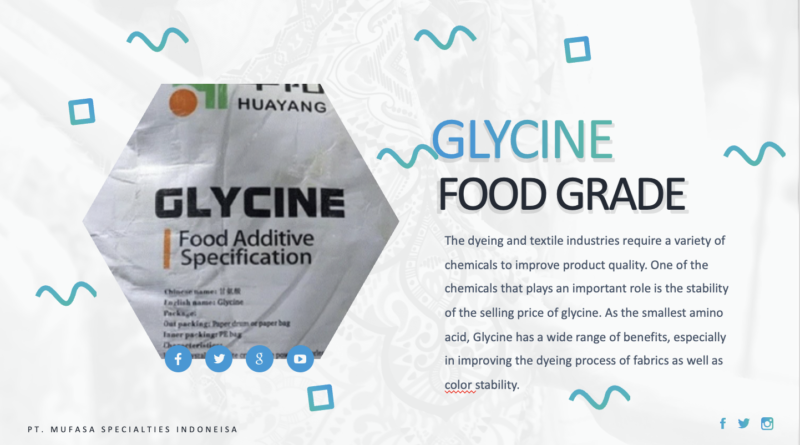Supplier Glycine
The tobacco industry continually seeks innovations to enhance product quality, taste, and safety. One key additive that has gained significant attention is Glycine. This simple amino acid plays an essential role in the formulation of tobacco products, improving their sensory characteristics and combustion properties. Additionally, the role of Supplier Glycine is crucial in ensuring the highest quality standards in tobacco production. Therefore, this article explores in depth the significance of glycine in the tobacco industry, including its functions, benefits, and the critical role of suppliers. As a result, it provides a comprehensive understanding of how glycine is shaping the tobacco industry.
Supplier Glycine in the Tobacco Industry: A Comprehensive Analysis
Glycine is the simplest amino acid with the chemical formula C₂H₅NO₂. Moreover, it is non-essential, meaning the human body can synthesize it. Additionally, glycine is highly soluble in water and has a sweet taste, which makes it an attractive ingredient for the tobacco industry. The mild nature of glycine allows it to blend well with other additives, thereby further enhancing the smoking experience. Consequently, glycine has become a fundamental component in tobacco formulations.
Role of Glycine in Tobacco Processing
Glycine serves multiple functions in the tobacco industry. Below are some key roles:
1. Flavor Enhancement
Glycine is known for its sweet and umami-like taste. In particular, when added to tobacco products, it helps to balance the harshness of nicotine and other strong compounds. As a result, many cigarette manufacturers utilize glycine to create a smoother smoking experience. Furthermore, this improvement in flavor contributes to consumer satisfaction, making glycine an essential additive.
2. Combustion Modifier
A well-balanced burning rate is critical for any tobacco product. In this regard, glycine aids in modifying the combustion characteristics by regulating the burning speed, ensuring an even burn, and reducing the release of unwanted by-products. Therefore, manufacturers can achieve better control over the burning process, enhancing the overall smoking experience.
3. Reduction of Harshness
Nicotine and tar contribute to the harshness of tobacco smoke. However, glycine, due to its mild and slightly alkaline properties, can neutralize some of the acidic compounds, thereby making the smoking experience less irritating. Consequently, smokers experience reduced throat irritation, which enhances product appeal.
4. Improvement in Aroma
The tobacco aroma is a significant factor in consumer satisfaction. In this context, glycine contributes to the overall fragrance of the tobacco by reacting with reducing sugars and other compounds during combustion, thereby enhancing the perceived aroma. As a result, the pleasant scent further improves the appeal of tobacco products.
Quality Assurance and Supplier Glycine
The role of Supplier Glycine in the tobacco industry is crucial, as it determines the purity and quality of the glycine used in production. Furthermore, reliable suppliers must meet the highest standards of purity, consistency, and regulatory compliance. Therefore, manufacturers need to carefully select suppliers that meet industry benchmarks. Some key considerations for selecting a glycine supplier include:
- Purity and Composition: The glycine supplied must be free from contaminants to ensure safety in tobacco consumption. Moreover, purity directly affects the overall quality of the final tobacco product.
- Regulatory Compliance: Compliance with FDA, WHO, and other regulatory bodies is essential. Therefore, manufacturers must ensure that their glycine sources adhere to strict industry guidelines.
- Supply Chain Stability: Reliable suppliers ensure a consistent supply, thereby preventing disruptions in tobacco manufacturing. Consequently, supply chain management plays a key role in maintaining production efficiency.
- Research and Development: Innovative suppliers work closely with tobacco companies to enhance glycine applications in the industry. As a result, ongoing advancements continue to refine the role of glycine in tobacco products.
Market Demand and Supplier Glycine
With increasing demand for enhanced smoking experiences and regulatory compliance, the need for high-quality glycine is growing. As a result, Supplier Glycine plays a pivotal role in meeting this demand by providing tailored solutions that align with industry requirements. Additionally, tobacco manufacturers are constantly seeking suppliers who can offer high-purity glycine at competitive prices. Furthermore, the market for glycine is expanding due to the increasing focus on product optimization and regulatory standards.
Future Trends in Glycine Application in Tobacco
As the tobacco industry evolves, the use of glycine is expected to expand. Some notable future trends include:
- Development of Low-Harm Tobacco Products: Glycine may be used in the formulation of reduced-risk tobacco products to minimize harmful effects. Consequently, this trend aligns with the global shift towards harm reduction strategies.
- Innovations in Tobacco Processing: Advanced processing techniques incorporating glycine can enhance tobacco product quality. Therefore, continued research will likely lead to more efficient applications of glycine.
- Sustainable Sourcing of Glycine: Ethical sourcing from environmentally friendly production methods is becoming a priority for Supplier Glycine. As a result, the industry is expected to adopt more sustainable production practices.
PT. Mufasa Specialties Indonesia is Reliable Supplier Glycine with High Quality Product and Good Price. We are Serving and Delivered Area such Jakarta Bandung Semarang Jogja Surabaya Medan and Batam
Glycine plays an integral role in the tobacco industry by enhancing flavor, modifying combustion, and reducing harshness. In addition, the contribution of Supplier Glycine is essential in maintaining high standards and ensuring consistent quality in tobacco manufacturing. Consequently, with ongoing advancements, glycine will continue to be a key ingredient in shaping the future of tobacco products. Moreover, as consumer preferences shift and regulations evolve, the role of glycine is expected to grow even further, making it an indispensable component in modern tobacco production.

